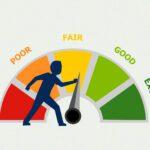Credit scores are numbers that lenders use to determine whether you’re creditworthy or not. The score is based on an analysis of your credit files. Typically, your score will be based on how recent your credit activity is and how long your credit history has been established. Recent credit activity can lower your score.
Lenders use your credit reports to calculate your credit score
Your credit score is a rating that lenders use to determine if you’re a good credit risk. It represents your repayment history and is calculated based on the information you provide in your credit report. The higher your score is, the less risky you are to a lender. A high score can make it easier to qualify for loans and get better interest rates. Different lenders use different methods to calculate your credit score.
Your credit score is based on several factors. Your debt-to-income ratio, the amount you’ve borrowed in the past, and the type of loans you’ve had affect your score. Those factors, combined with the information your credit reports provide, make your credit score highly relevant to lenders. If you don’t have any credit history, lenders may still consider these factors when determining whether to give you credit.
Your payment history makes up about 35% of your score. This information shows whether you have made payments on time and whether you’ve missed payments. If you’ve made late payments in the past, the lender will record them on your credit report and hurt your score. Your payment history includes how many accounts you have open and closed, how much you owe to creditors, how recently you’ve missed a payment, and other items. If your payment history is cluttered with late payments or bankruptcy, this will hurt your credit score.
New credit counts for 10% of your score
Your credit score is based on the credit mix, which is the mix of different types of accounts you have on your credit report. It is important to have a diverse credit mix, as creditors want to see that you can handle various types of credit responsibly. It is important to avoid opening new accounts just to satisfy your credit mix, as it can negatively affect your score.
Credit bureaus calculate your score based on your payment history, debt burden, length of credit history, and number of recent inquiries. A new account will lower your score if you have a high balance. Paying your balance on time and making minimum payments will raise your score. If you have a $5,000 credit card limit, it is important to make sure that you are making timely payments on the account. Closing a credit card account may also reduce your score.
Credit scoring models take into account your payment history to determine if you are likely to default on your payments. The longer your credit history, the less risky you are. In addition, a longer credit history means that there are more items to evaluate. Your oldest and newest account will be looked at, as well as the average age of all your accounts. You can increase your credit limit by applying for a new credit card. However, this won’t boost your credit score.
Length of your credit history counts for 15%
The length of your credit history counts for 15% of your credit score, which can influence whether or not you qualify for loans. Lenders look at your credit history to assess your reliability and establish a history of credit usage. The longer your history, the better. However, if your history is too short, you may find it difficult to obtain a loan.
Your credit score is based on many factors, but the length of your credit history is one of the most important. This includes the average age of your accounts and your payment history. If you open new credit accounts recently, you may reduce the average age of your existing accounts and hurt your overall score. While credit age is important, it is not equally weighted in the formula used by the three credit scoring models. As a general rule, the longer your credit history, the higher your credit score.
Your credit age refers to how long you’ve had the same accounts. If you have two or three credit cards with the same age, you must maintain the older ones. This will keep your total available credit at an acceptable level. This means a lower credit utilization rate.
Recent credit activity can lower your score
Recent credit activity, which makes up 10% of your credit score, is a major factor in your overall credit rating. It shows lenders that you have used credit responsibly paid your bills. Too much or too little of this activity will lower your score. Having too many credit cards or loans can also lower your score. Even if you’ve paid them off, having too many can affect your credit score. Using credit responsibly and making timely payments is the best way to raise your credit score. This way, lenders will be able to offer you competitive rates.
A recent late payment miss will reduce your credit score by 90 to 110 points. Credit card issuers report your payment history to the credit bureaus each month. If you’re thirty or more days behind on your payments, this can affect your score significantly. Missed payments will appear on your report for seven years, so you want to make sure you make all payments on time.



